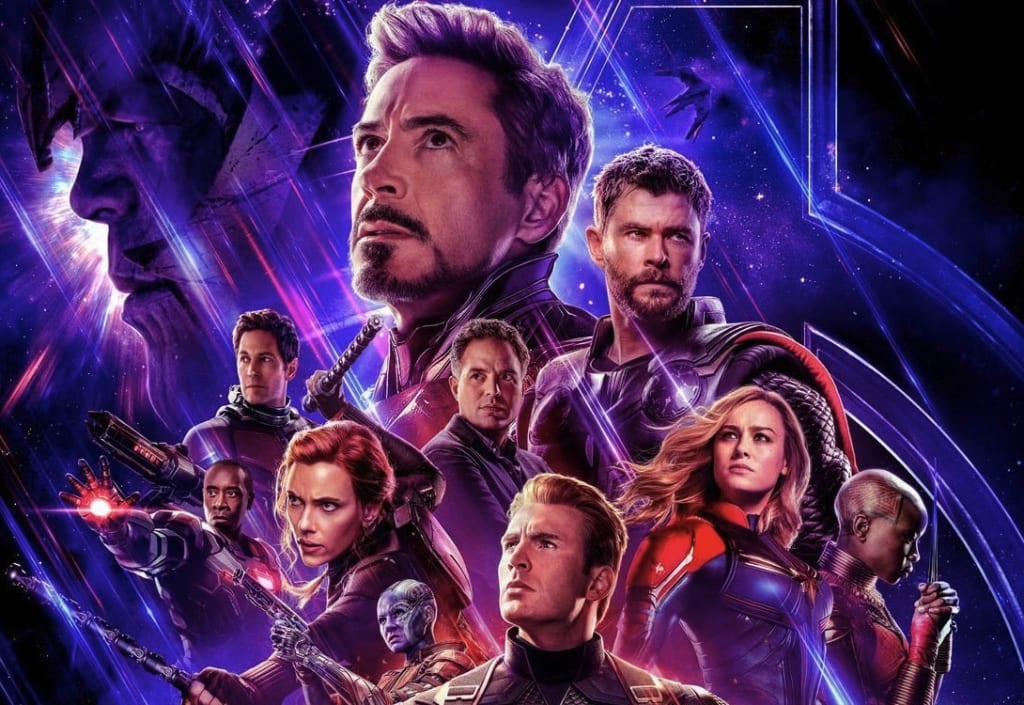'Avengers: Endgame'
Spoiler culture, and recycled plot lines–the death of story telling.

Avengers: Endgame was the movie to end all movies, literally.
It wrapped up 10 years of Marvel Cinematic Universe story-telling and media. It ended the arcs of major characters in a battle of universal (literally) proportions.
It was hyped up for a whole year to prepare fans for this supposedly epic battle to save, not just the world this time, but the universe.
At the same time, a lot of talk around the movie focused on a thing the directors hated (or did they?): spoilers.
Spoilers are supposed to be the death of a thing–if you know the end, then why bother with the rest?
Well, frankly, bother with the rest of it, because it's supposed to be good. Knowing the end of something is absolutely not intended to ruin the rest of the work. If a work has substance, and a thoroughly worked out plot that alludes to what the finale will be, then knowing or figuring out the end before it happens should actually be a delight!
Instead though, many shows focus on shock factor in story telling. This is true of Game of Thrones, as well as the MCU. Actors are misled, strictly limited from revealing anything, and often the actual media itself–the show or the movies–never or hardly ever show a logical progression to twists in the story. It's engineered so everything is unpredictable, and there's a big issue with this.
As an audience member, never knowing what's coming can be incredibly frustrating. On the one hand, it means lots of anticipation, and excitement, because anything can happen. On the other hand, it's hard to support a story that seems loosely connected, because the show makers always have the excuse that anything can happen.
Stories have become reliant on word of god: a phrase that refers to when an author or writer uses their authority as content creator to justify their work. Generally, we might expect that, that author is the expert. But at the same time, having a culture of media reliant on this trait has allowed content creators to not justify events in the canon of their story, and then later on Twitter, or in interviews provide explanations never included in their original work.
Need proof this is a thing? See J.K. Rowling's tweets about the Harry Potter universe, see the Russo brother's defend all their decisions, and know that many other creators do the same thing when the audience questions them.
Now, what's the issue with everything I just described?
Honestly nothing. Not alone that is.
If there was just one big story, or one big movie following this pattern, there would be no real problem! The issue is that following this trend of popular media, spoiler culture, and plot explanations have become a hot, and even violent topic.
This is also why I said the Russo brothers only supposedly hate spoilers. What bigger way is there to cause a chain reaction of easy movie promotion than entrenching your story and actors in secrecy? Making everything very high stakes with the strict advertisement of NO SPOILERS, and of secret, unexpected plot twists, and character deaths is a good way to double free marketing at any rumor of a spoiler leak.
It also means people would be motivated to see the movie faster, bumping up sales opening weekend, and in general. It promotes the idea that the faster you see the movie, the better. If there’s anyone who benefits from all of that, it’s the creators.
Whether their adamant no spoiler stance is genuine or not, the Russo's reap substantial benefits from both sides: getting attention from those who want spoilers, and those who don’t.
And what all of this does is continue to hype up the idea of a viewing hierarchy: the faster you see something, the more you care. It continues the idea that the only real fans are the die-hard fans. It means no spoiler culture is legitimized by the sheer number of people who just tack on, and agree that’s the way things should be.
Now, I think it’s worth mentioning how this all connects back to movie quality. That’s really the point I’m trying to get at here.
Before Endgame came out, I had seen the spoilers. I had seen, and read that reddit post that describes (entirely accurately) the entire plot of the movie. Reading that post, it sounded like one of the worst, most convoluted movies, and I had no interest in seeing it.
I still went though, like so many others, to see it (though I proudly add I went three weeks after opening, and only because I was dragged along by friends).
I have seen every MCU movie. I loved the first Avengers back in 2012, and had been hooked since then. But in all this hype around Endgame, I grew really apathetic to the story.
And watching that movie? I felt the same. I’m keeping this spoiler free (so don’t worry or come chew my ass out) but I thought the fights had no stakes in them. It was the same as every other fight that has been in every other MCU movie for the past ten years, and I’m sorry for expecting something a little more substantial.
As always, lines were kitschy and predictable, but because the stakes of this movie were supposed to be So Huge (again, literally the universe at stake) it felt disingenuous. Some epic battle was happening on screen (one that again looked like every other fight in every other marvel movie), and I found myself missing that more lighthearted feel of early MCU.
It was three hours where it was obvious the heroes couldn’t win yet. Which makes all of the battles leading up to the final one relatively boring. The stakes we're supposed to believe in as an audience aren’t there when we already know they’ll lose now, only to win later.
It was three hours that could have been boiled down and simplified, because so much of it was predictable and stale. And the parts that are new? Those are the ones explained with word of god, those are the details that don’t add up with the logic the universe establishes. And when people ask the creators, they don’t agree on why things worked out, or why characters did what they did.
That’s the heart of the issue. Focusing on telling a story entirely for shock value means that even the creators don’t agree on why characters behave the way they do. It means as an audience member, it’s hard to watch a character you love do something confusingly uncharacteristic, because creators threw consistency out the window for the sake of it.
About the Creator
E.A. Forster
A fan of literature and cinema, following civil rights and the LGBT+ community. History enthusiast, artist, writer, and journalist.






Comments
There are no comments for this story
Be the first to respond and start the conversation.